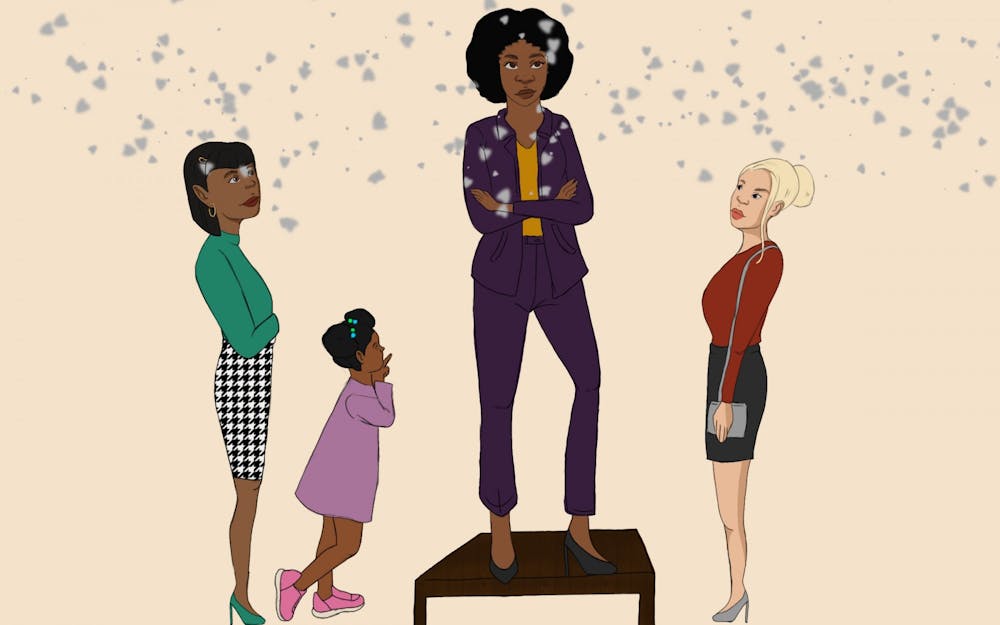An article with the headline “The US economy lost 140,000 jobs in December. All of them were held by women'' was widely circulated on social media platforms in January. Several social media users were quick to note what the article’s headline did not — Black and Latina women lost jobs in December. White women gained jobs.
To address these disparities, we must reframe our cultural understanding of women’s equality in the workforce and implement policies that economically support marginalized women.
Nationally, unemployment among white women rose by 2.4% between January 2020 and January 2021. Unemployment among Black women rose by nearly a full percent more — 3.3%. Throughout the COVID-19 pandemic Black women have faced high rates of unemployment due to the precarious nature of employment in marginalized groups.
In Indiana, Black women face far higher unemployment rates than white women. As of December, the unemployment rate of Black women was 13%, compared to 6.7% in white women, according to data provided by Scott Olson, media director of the Indiana Department of Workforce Development.
First, we must dismantle notions of white feminism that incentivize privileged white women to prioritize their own economic success over the collective advancement of women.
White feminism, as defined by author Koa Beck, is an ideology that equates feminism to the individual career success of women within capitalist and patriarchal systems, rather than attempting to alter those systems.
This school of thought should be condemned as inherently anti-feminist. As disparities in COVID-19 job loss glaringly reveal, the economic advancement of white women is not a path to gender equality for all women.
“I don’t agree with the premise that capitalism was supporting feminism, even among privileged women who were breaking glass ceilings,” Dr. Candis Smith, a lecturer in the Department of African American and Diaspora Studies at IU, said. “These women may have been chasing capitalism, but capitalism wasn’t concerned with their interests or advancing gender equality.”
Rather than prioritize the success of white, privileged and employed women, we should focus our collective efforts on alleviating structural barriers which impede upon the economic stability of marginalized women. The nation must first create and support jobs in fields occupied predominantly by Black women.
Black women are disproportionately represented in education, hospitality and retail industries. The federal government should enact job-creation programs reminiscent of the New Deal to rebuild these sectors following the pandemic.
“When President Franklin D. Roosevelt created the ‘alphabet agencies’ they were very controversial,” Smith said. “The government taking a greater stand in the welfare of its people was very controversial, just as it is controversial today.”
Additionally, care workers should be compensated for unpaid caretaking work through government subsidies.
Out of all caretaking mothers who do not work outside of the home, 49% are from a marginalized group. While these women do valuable and necessary work, such as childcare or care for the elderly, they receive no compensation and are thus stripped of economic agency.
“It’s a self-reinforcing cycle,” said professor Shruti Rana, assistant dean of the Hamilton Lugar School of Global and International Studies. “Part of the reason that care work has been excluded from so many different calculations of value is in part because we do not recognize care work as work but even more so, work that is done by women of color, including care work, is devalued.”
A system of compensation for caretakers within the home is already in place in Canada and Australia, and should be urgently adopted in the United States.
The federal government must also rebuild welfare and unemployment benefits in fields composed of Black women.
Black women are in a double-bind, being both more likely than white women to be unemployed as a result of COVID-19 and less likely to access unemployment assistance from the state.
“One reason that certain jobs were originally left out of social security or certain types of women were not allowed to access what we now call welfare benefits: exclusions from those categories were originally highly correlated to race,” Rana said. “Many have argued so-called ‘domestic workers’ were excluded from original social security and New Deal efforts in part because that money would have gone to women of color.”
During the pandemic, unemployed Black Americans were about half as likely as white Americans to access unemployment benefits. This is in large part due to more restrictive unemployment policies in disproportionately Black southern states. Expanding accessibility to unemployment relief would aid all Americans, particularly Black women who have long been excluded from such systems of support.
COVID-19 unemployment data should be a wake-up call. Black women do not have equal access to our nation’s economy, and it’s time for structural remedies.
Maddie Butler (she/her) is a sophomore studying International Law and Institutions and Arabic. She is the Director-General of Indiana Model United Nations.






